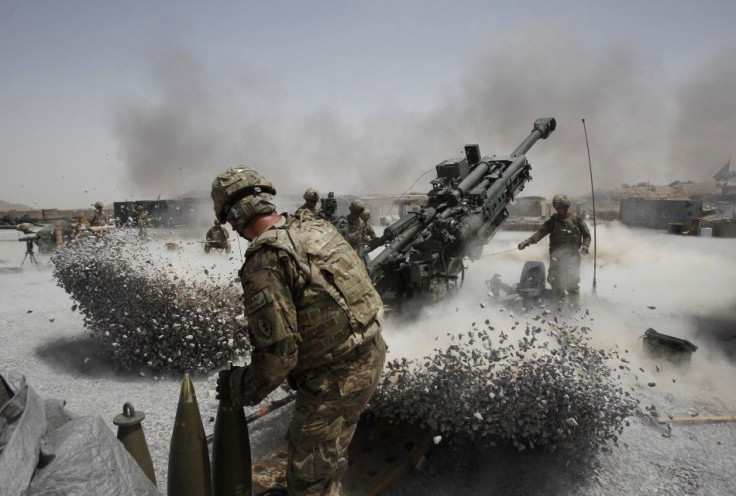Opinion: Did Osama Bin Laden Succeed?
OPINION

So we are continuing this policy in bleeding America to the point of bankruptcy. Allah willing, and nothing is too great for Allah.
-- Osama bin Laden speech, 2004
Shoot, coward, you're only going to kill a man.
-- Che Guevara, alleged last words
Osama bin Laden's May 2, 2011 death by a Navy SEAL bullet seemed to provide a cathartic and fitting coda to a decade defined by the attacks of Sept. 11, 2001. With Al Qaeda demoralized and reeling from a relentless campaign of drone attacks and targeted killings, including the one that finally claimed the terrorist organization's mastermind, America had recorded a decisive victory over those who would do it harm.
But such a neat conclusion belies the extent to which bin Laden has achieved his aims in the decade since Sept. 11, 2001. His boasts of overthrowing Israel, of forcing America to withdraw entirely from the Middle East or of establishing a universal caliphate governed by Sharia law never came to fruition. But he did succeed in goading the U.S. into two economically disastrous wars that helped to create new extremists by fomenting anti-American rancor.
A combined 6,119 troops have died in Iraq and Afghanistan, and many more have returned home emotionally and physically shattered by what they endured during the multiple deployments demanded of an overextended U.S. military. And beyond the conflicts in Iraq and Afghanistan -- both of which American troops are scheduled to exit without any clear resolution -- bin Laden helped to plunge America into an era of unceasing warfare.
In a 2004 address, bin Laden boasted how the Bush administration's policies had made it easy for us to provoke and bait this administration, adding that as for the size of the economic deficit, it has reached record astronomical numbers estimated to total more than a trillion dollars.
Estimates for the cost of America's conflicts vary. A March 2011 analysis by the Congressional Research Service pegged the amount at just under $1.3 trillion, while a study by Brown University calculated that the added price of operations in Pakistan, of the benefits due to veterans and of the interest due on debt put the total cost closer to $4 trillion. Both wars were marked by extraordinary waste and abuse that squandered billions of dollars.
Whatever the exact amount, the astronomical cost of the wars has contributed to an economic crisis that has undermined American prosperity -- including our ability to care for our veterans -- and all but paralyzed our political system. Of course, the financial crisis of 2007 played a huge role, as have broader structural changes in the economy. But bin Laden's 2002 prediction that, like the Soviets before them, America would face political breakup and economic bankruptcy seems prescient.
Iraq, Afghanistan -- Two Questionable Actions
In the same sentence, bin Laden used the phrase military defeat. Defeat may be too strong a word for the outcome of America's wars in Iraq and Afghanistan, but calling them victories would be equally false. August marked the first month since March 2003 in which no American troops died in Iraq, and the Obama administration is embroiled in a fierce debate over whether the country is safe enough to withdraw U.S. troops by the December 2011 deadline set nearly three years ago.
As for Afghanistan, the graveyard of empires remains as apt a description as ever. Triumphalist reports of the Taliban's defeat in 2011 proved premature, to the point that U.S. Secretary of State Hilary Clinton has reluctantly said that offering the Taliban a seat at the negotiating table is essential to the country's future.
Even as American troops begin their slow exit from Afghanistan, the Obama administration has intensified drone strikes and special operations forces missions in places like Yemen and Somalia, where extremism continues to flourish. Those campaigns are sanctioned under an Authorization for Use of Military Force, passed in the days following Sept. 11, 2001, that gives the president broad powers to deploy force against nations, organizations or individuals who carried out the attacks or who harbor those responsible. They are emblematic of how America has entered into what a recent military analysis dubbed a period of persistent conflict.
The perpetual conflict status quo has been reinforced by the transformation of the Central Intelligence Agency and of Special Operations forces into instruments of endless war. That war differs from the conventional model of clashing armies because it occurs for the most part out of public view. If it is less costly it is also more insidious, and it is reminiscent of the endless war of attrition bin Laden sought.
This is not to say that bin Laden's hateful ideology has been vindicated, or that he has won. To reduce the conflicts of the past decade to winners and losers would be a gross oversimplification, and the democratic movements flowering across the Middle East provide an unassailable counterpoint to bin Laden's violent and cynical prophecy. But it is equally undeniable that certain aspects of the world bin Laden envisioned have come to pass.
© Copyright IBTimes 2024. All rights reserved.





















